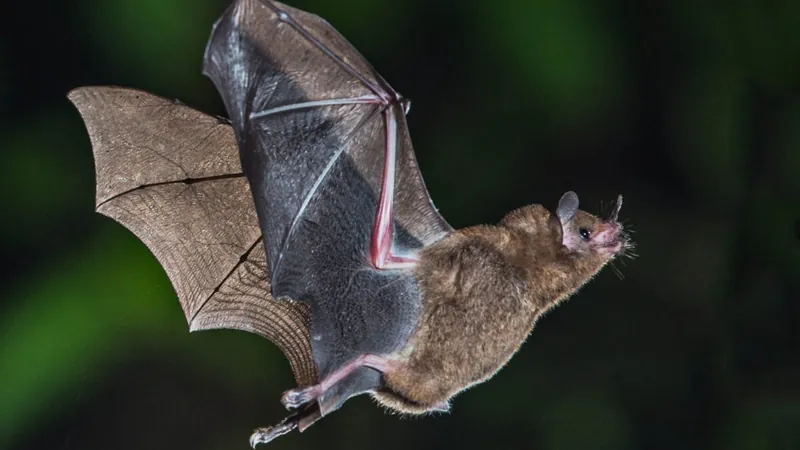
Unlocking the Mystery: Why Bats Are Cancer-Free and What It Means for Us
2025-06-12
Author: Wei
The Amazing Lifespan of Bats
When you think about longevity in the animal kingdom, the Greenland shark often takes the spotlight, boasting a staggering lifespan of over 250 years. But did you know that bats, too, are fascinating contenders in the longevity race? Some bat species can live for up to 25 years—equivalent to a whopping 180 human years—while remarkably keeping cancer at bay.
Bats: Masters of Cancer Resistance
Recent research conducted by teams at the University of Rochester has unearthed what they describe as the anti-cancer "superpowers" of four bat species: the little brown bat, the big brown bat, the cave nectar bat, and the Jamaican fruit bat. The findings could revolutionize our understanding of cancer treatment in humans.
Despite their lengthy lifespans and numerous cell divisions, bats report few to no tumors in both wild and captive populations. As the researchers explain, longer lifespans coupled with increased cell division usually heighten cancer risk. Yet bats defy this trend.
The Secrets of Bat Biology
Leading the investigation, biologists Vera Gorbunova and Andrei Seluanov uncovered various biological defenses that shield bats from cancer. One key discovery is the tumor-suppressor gene p53. Interestingly, little brown bats carry two copies of this gene and exhibit high p53 activity, enabling them to effectively eliminate cancer cells during a process called apoptosis.
The researchers propose that certain bat species may have enhanced p53 activity as an evolutionary advantage against cancer, akin to what's seen in elephants. However, an overload of p53 could lead to excessive cell death, which bats seem to manage skillfully, finding a delicate balance that humans struggle with—around 50% of human cancers feature mutations that impair p53 functionality.
Endless Cell Division—With a Catch!
Additionally, the study examined the behavior of telomerase, an enzyme that enables bat cells to multiply indefinitely. While this sounds like a green light for cancer growth, bats counteract this risk with their heightened p53 activity that can adequately eliminate developing cancer cells.
A Unique Immune System
Bats possess an extraordinary immune system that helps them thrive despite exposure to a multitude of deadly viruses. The researchers noted fascinating adaptations that may not only ward off viral infections but could also play a role in recognizing and destroying tumor cells, thereby reducing inflammation—a factor that may contribute to cancer.
The Cancer Prevention Puzzle
Despite the complexity of cancer development, which requires several "oncogenic hits" to transform normal cells into harmful ones, researchers found that it only takes two hits for normal bat cells to become malignant. Bats may not be cancer-proof, but they have incredibly robust tumor-suppressor mechanisms that set them apart from us.
What This Means for Human Science
Understanding the unique traits that protect bats from cancer can provide groundbreaking insights into human cancer prevention and treatment. With ongoing research, what we learn from these remarkable creatures not only deepens our knowledge of biology; it may one day lead to novel therapies that enhance human cancer resilience.



 Brasil (PT)
Brasil (PT)
 Canada (EN)
Canada (EN)
 Chile (ES)
Chile (ES)
 Česko (CS)
Česko (CS)
 대한민국 (KO)
대한민국 (KO)
 España (ES)
España (ES)
 France (FR)
France (FR)
 Hong Kong (EN)
Hong Kong (EN)
 Italia (IT)
Italia (IT)
 日本 (JA)
日本 (JA)
 Magyarország (HU)
Magyarország (HU)
 Norge (NO)
Norge (NO)
 Polska (PL)
Polska (PL)
 Schweiz (DE)
Schweiz (DE)
 Singapore (EN)
Singapore (EN)
 Sverige (SV)
Sverige (SV)
 Suomi (FI)
Suomi (FI)
 Türkiye (TR)
Türkiye (TR)
 الإمارات العربية المتحدة (AR)
الإمارات العربية المتحدة (AR)